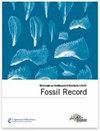基于印度尼西亚南苏拉威西岛托纳萨地层钙质化石的始新世到渐新世边界和古气候迹象
IF 2.1
4区 地球科学
Q3 Earth and Planetary Sciences
引用次数: 0
摘要
印度尼西亚南苏拉威西岛杰内蓬托地区托纳萨地层的生物地层学至今仍鲜为人知,而且年代不详,如大部分渐新世至中新世早期。托纳萨地层在杰内蓬托行政区沿岸出露较多,其中卡拉马地区是该地层最重要的露头,该地区的地层由泥灰岩和石灰岩互层组成。我们的研究重点是根据化石研究卡拉马地区 A 部分的生物地层。样本通过测量地层方法采集,然后使用涂片进行研究。通过半定量分析确定了物种组合。数据分析得出了三个化石基准(边界):首次出现(FO)的Sphenolithus pseudoradians(NP19/NP20)、首次出现的Sphenolithus distentus(CP.16/CP.17)和最后出现(LO)的Sphenolithus predistentus(NP.23/NP.24)。根据钙质浮游动物确定了分区边界;在该区段发现了托纳萨地层晚始新世至中渐新世的边界。有趣的是,在这一时期,该区段的标志物种是 Sphenolithus。此外,Sphenolithus、Discoaster 和 Zygrhablithus bijugatus 的出现表明当时盆地处于暖水状态。本文章由计算机程序翻译,如有差异,请以英文原文为准。
The Eocene to Oligocene boundary and paleoclimatic indications based on calcareous nannofossils of Tonasa Formation, South Sulawesi, Indonesia
The biostratigraphy of the Tonasa Formation in the Jeneponto Regency of South Sulawesi, Indonesia, is still poorly known, and there are barren ages, such as much of the Oligocene to Early Miocene. The Tonasa Formation is well exposed along the coast of the Jeneponto Regency, in which the Karama area consists of the most important outcrops of this formation which in this area consists of interbedded marl and limestone. Our study focuses on the biostratigraphy of the Karama area section A based on nannofossil. Samples were collected by measured stratigraphy methods and then subjected to investigation using smear slides. The assemblages of species were determined by semiquantitative analysis. Data analysis obtained three nannofossil datums (boundaries): The First Occurrence (FO) of Sphenolithus pseudoradians NP19/NP20), the First Occurrence of Sphenolithus distentus (CP.16/CP.17), and the Last Occurrence (LO) Sphenolithus predistentus (NP.23/NP.24. The zonal boundary was determined based on calcareous nannoplankton; the Late Eocene to Middle Oligocene boundary of the Tonasa Formation was found in this section. Interestingly, throughout this period, the marker species in this section is Sphenolithus. In addition, the presence of Sphenolithus, Discoaster, and Zygrhablithus bijugatus indicated that the basin was in warm water condition.
求助全文
通过发布文献求助,成功后即可免费获取论文全文。
去求助
来源期刊

Fossil Record
PALEONTOLOGY-
CiteScore
2.50
自引率
7.10%
发文量
18
审稿时长
>12 weeks
期刊介绍:
Fossil Record (FR) is the palaeontological journal of the Museum für Naturkunde Berlin. This journal was founded in 1998 under the name Mitteilungen aus dem Museum für Naturkunde Berlin, Geowissenschaftliche Reihe and appears with two issues each year. Fossil Record publishes original papers in all areas of palaeontology including the taxonomy and systematics of fossil organisms, biostratigraphy, palaeoecology, and evolution. All taxonomic groups are treated, including invertebrates, microfossils, plants, and vertebrates.
 求助内容:
求助内容: 应助结果提醒方式:
应助结果提醒方式:


